HR Professional Development Report: Tesco's Approach to HR
VerifiedAdded on 2023/06/07
|18
|4528
|395
Report
AI Summary
This report delves into the critical aspects of HR professional development, exploring the essential knowledge, skills, and behaviors required for success in the field. It examines the importance of continuous learning and professional development, analyzing the differences between organizational and individual learning, training, and development. The report includes a personal skills audit and development plan, providing practical examples and strategies applicable to the context of Tesco, a multinational retailing brand. Furthermore, it analyzes the impact of High-Performance Work Systems (HPWS) on employee engagement and competitive advantage, along with an evaluation of performance management approaches, such as collaborative working, and how these support a high-performance culture and commitment within the organization. The report provides a comprehensive overview of HR practices and strategies, with specific examples and insights relevant to the modern workplace.
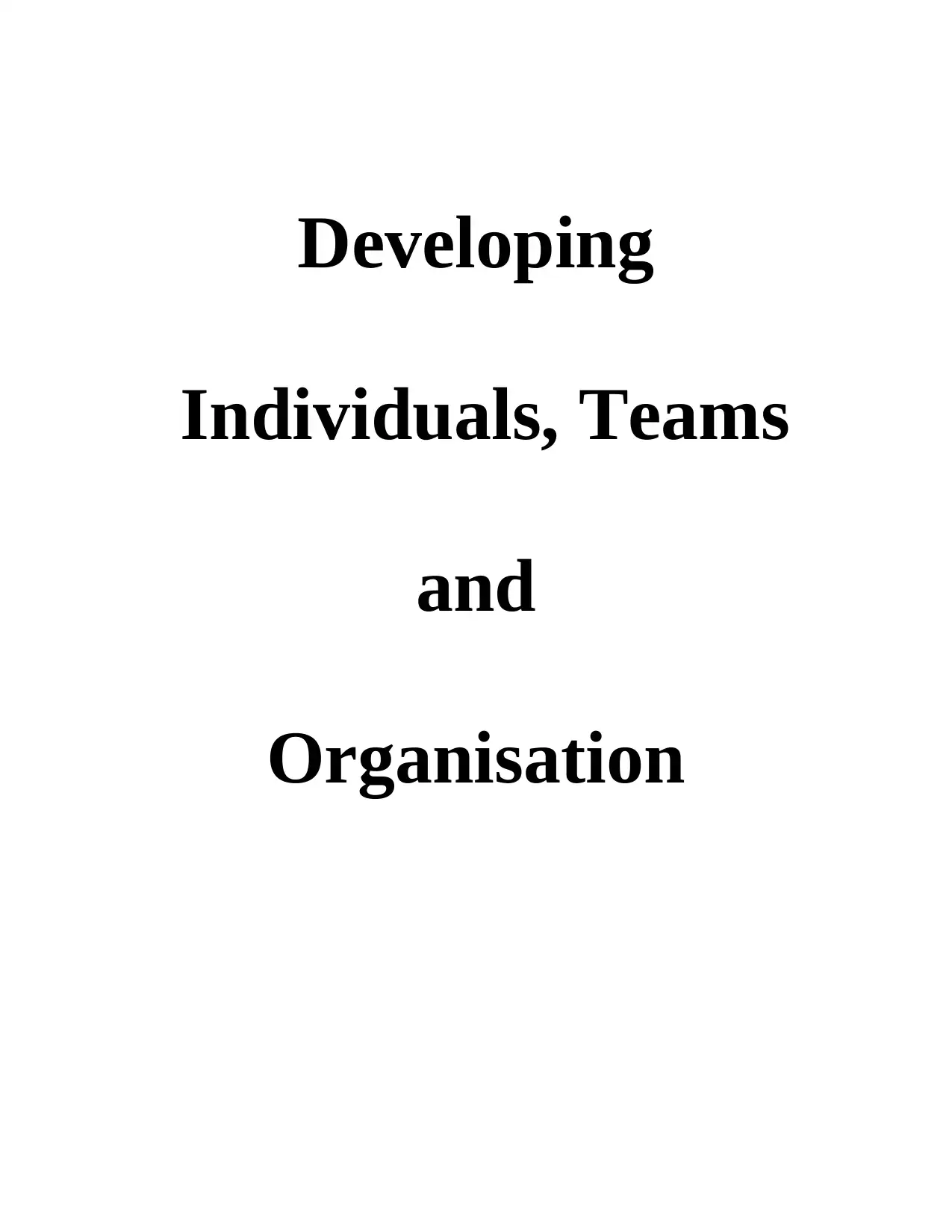
Developing
Individuals, Teams
and
Organisation
Individuals, Teams
and
Organisation
Paraphrase This Document
Need a fresh take? Get an instant paraphrase of this document with our AI Paraphraser
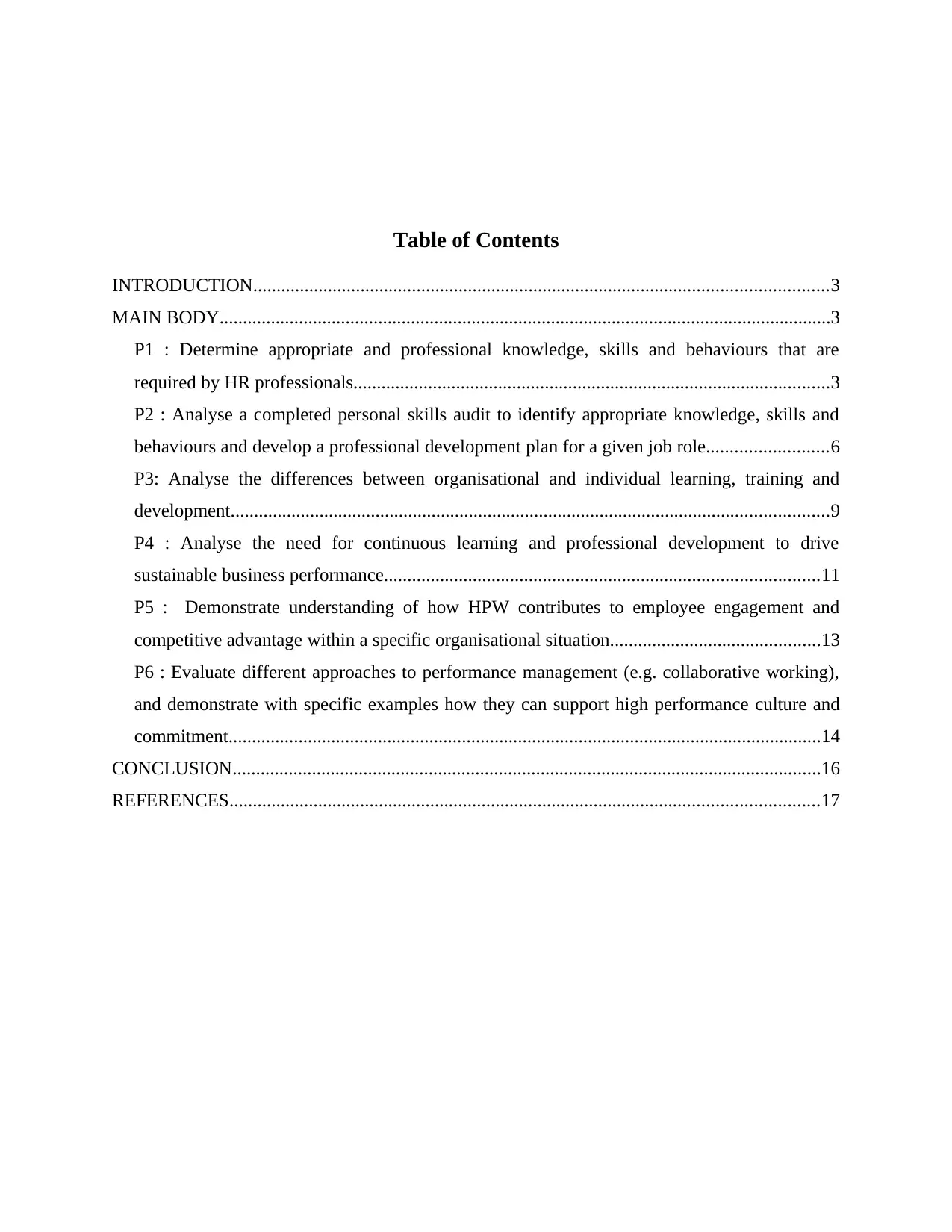
Table of Contents
INTRODUCTION...........................................................................................................................3
MAIN BODY...................................................................................................................................3
P1 : Determine appropriate and professional knowledge, skills and behaviours that are
required by HR professionals......................................................................................................3
P2 : Analyse a completed personal skills audit to identify appropriate knowledge, skills and
behaviours and develop a professional development plan for a given job role..........................6
P3: Analyse the differences between organisational and individual learning, training and
development................................................................................................................................9
P4 : Analyse the need for continuous learning and professional development to drive
sustainable business performance.............................................................................................11
P5 : Demonstrate understanding of how HPW contributes to employee engagement and
competitive advantage within a specific organisational situation.............................................13
P6 : Evaluate different approaches to performance management (e.g. collaborative working),
and demonstrate with specific examples how they can support high performance culture and
commitment...............................................................................................................................14
CONCLUSION..............................................................................................................................16
REFERENCES..............................................................................................................................17
INTRODUCTION...........................................................................................................................3
MAIN BODY...................................................................................................................................3
P1 : Determine appropriate and professional knowledge, skills and behaviours that are
required by HR professionals......................................................................................................3
P2 : Analyse a completed personal skills audit to identify appropriate knowledge, skills and
behaviours and develop a professional development plan for a given job role..........................6
P3: Analyse the differences between organisational and individual learning, training and
development................................................................................................................................9
P4 : Analyse the need for continuous learning and professional development to drive
sustainable business performance.............................................................................................11
P5 : Demonstrate understanding of how HPW contributes to employee engagement and
competitive advantage within a specific organisational situation.............................................13
P6 : Evaluate different approaches to performance management (e.g. collaborative working),
and demonstrate with specific examples how they can support high performance culture and
commitment...............................................................................................................................14
CONCLUSION..............................................................................................................................16
REFERENCES..............................................................................................................................17
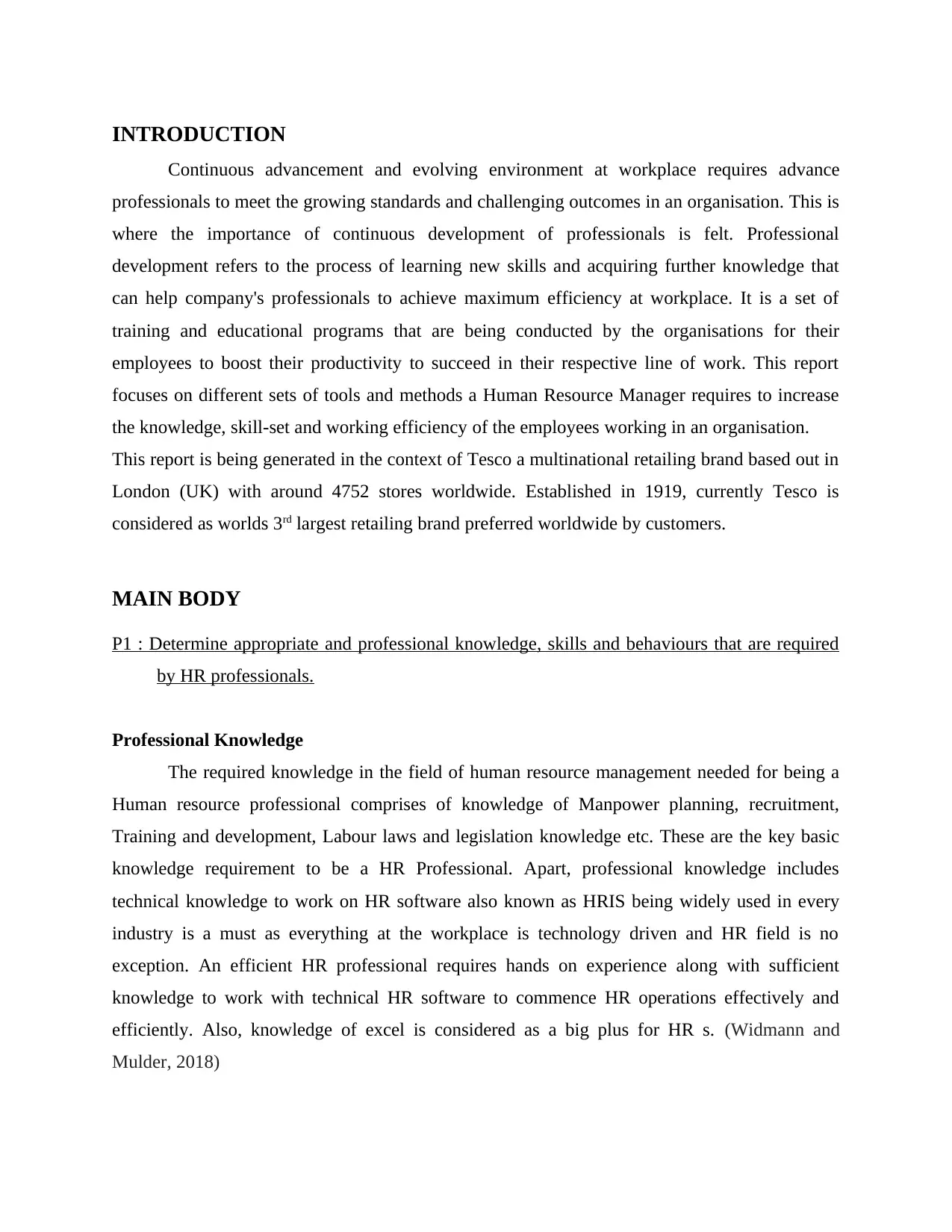
INTRODUCTION
Continuous advancement and evolving environment at workplace requires advance
professionals to meet the growing standards and challenging outcomes in an organisation. This is
where the importance of continuous development of professionals is felt. Professional
development refers to the process of learning new skills and acquiring further knowledge that
can help company's professionals to achieve maximum efficiency at workplace. It is a set of
training and educational programs that are being conducted by the organisations for their
employees to boost their productivity to succeed in their respective line of work. This report
focuses on different sets of tools and methods a Human Resource Manager requires to increase
the knowledge, skill-set and working efficiency of the employees working in an organisation.
This report is being generated in the context of Tesco a multinational retailing brand based out in
London (UK) with around 4752 stores worldwide. Established in 1919, currently Tesco is
considered as worlds 3rd largest retailing brand preferred worldwide by customers.
MAIN BODY
P1 : Determine appropriate and professional knowledge, skills and behaviours that are required
by HR professionals.
Professional Knowledge
The required knowledge in the field of human resource management needed for being a
Human resource professional comprises of knowledge of Manpower planning, recruitment,
Training and development, Labour laws and legislation knowledge etc. These are the key basic
knowledge requirement to be a HR Professional. Apart, professional knowledge includes
technical knowledge to work on HR software also known as HRIS being widely used in every
industry is a must as everything at the workplace is technology driven and HR field is no
exception. An efficient HR professional requires hands on experience along with sufficient
knowledge to work with technical HR software to commence HR operations effectively and
efficiently. Also, knowledge of excel is considered as a big plus for HR s. (Widmann and
Mulder, 2018)
Continuous advancement and evolving environment at workplace requires advance
professionals to meet the growing standards and challenging outcomes in an organisation. This is
where the importance of continuous development of professionals is felt. Professional
development refers to the process of learning new skills and acquiring further knowledge that
can help company's professionals to achieve maximum efficiency at workplace. It is a set of
training and educational programs that are being conducted by the organisations for their
employees to boost their productivity to succeed in their respective line of work. This report
focuses on different sets of tools and methods a Human Resource Manager requires to increase
the knowledge, skill-set and working efficiency of the employees working in an organisation.
This report is being generated in the context of Tesco a multinational retailing brand based out in
London (UK) with around 4752 stores worldwide. Established in 1919, currently Tesco is
considered as worlds 3rd largest retailing brand preferred worldwide by customers.
MAIN BODY
P1 : Determine appropriate and professional knowledge, skills and behaviours that are required
by HR professionals.
Professional Knowledge
The required knowledge in the field of human resource management needed for being a
Human resource professional comprises of knowledge of Manpower planning, recruitment,
Training and development, Labour laws and legislation knowledge etc. These are the key basic
knowledge requirement to be a HR Professional. Apart, professional knowledge includes
technical knowledge to work on HR software also known as HRIS being widely used in every
industry is a must as everything at the workplace is technology driven and HR field is no
exception. An efficient HR professional requires hands on experience along with sufficient
knowledge to work with technical HR software to commence HR operations effectively and
efficiently. Also, knowledge of excel is considered as a big plus for HR s. (Widmann and
Mulder, 2018)
⊘ This is a preview!⊘
Do you want full access?
Subscribe today to unlock all pages.

Trusted by 1+ million students worldwide
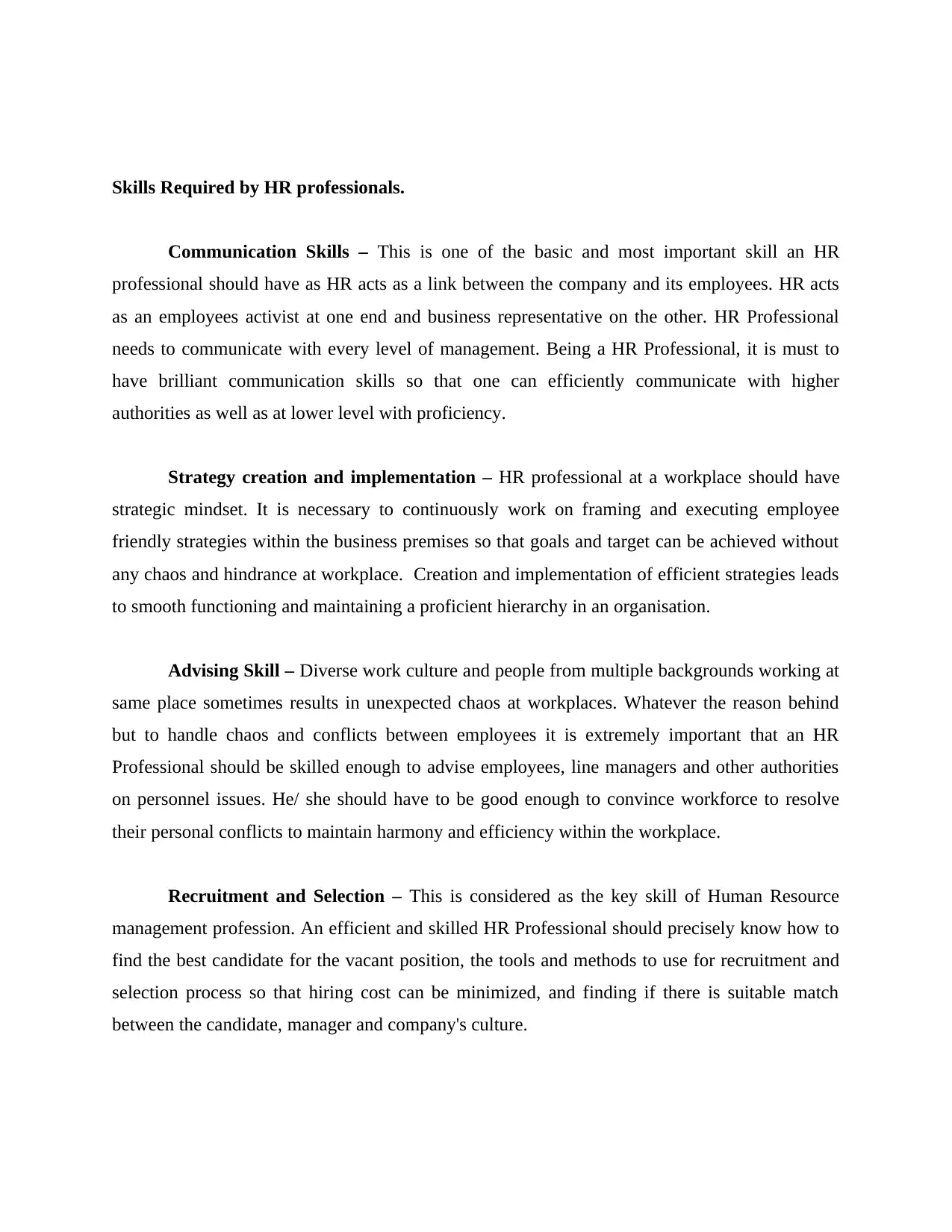
Skills Required by HR professionals.
Communication Skills – This is one of the basic and most important skill an HR
professional should have as HR acts as a link between the company and its employees. HR acts
as an employees activist at one end and business representative on the other. HR Professional
needs to communicate with every level of management. Being a HR Professional, it is must to
have brilliant communication skills so that one can efficiently communicate with higher
authorities as well as at lower level with proficiency.
Strategy creation and implementation – HR professional at a workplace should have
strategic mindset. It is necessary to continuously work on framing and executing employee
friendly strategies within the business premises so that goals and target can be achieved without
any chaos and hindrance at workplace. Creation and implementation of efficient strategies leads
to smooth functioning and maintaining a proficient hierarchy in an organisation.
Advising Skill – Diverse work culture and people from multiple backgrounds working at
same place sometimes results in unexpected chaos at workplaces. Whatever the reason behind
but to handle chaos and conflicts between employees it is extremely important that an HR
Professional should be skilled enough to advise employees, line managers and other authorities
on personnel issues. He/ she should have to be good enough to convince workforce to resolve
their personal conflicts to maintain harmony and efficiency within the workplace.
Recruitment and Selection – This is considered as the key skill of Human Resource
management profession. An efficient and skilled HR Professional should precisely know how to
find the best candidate for the vacant position, the tools and methods to use for recruitment and
selection process so that hiring cost can be minimized, and finding if there is suitable match
between the candidate, manager and company's culture.
Communication Skills – This is one of the basic and most important skill an HR
professional should have as HR acts as a link between the company and its employees. HR acts
as an employees activist at one end and business representative on the other. HR Professional
needs to communicate with every level of management. Being a HR Professional, it is must to
have brilliant communication skills so that one can efficiently communicate with higher
authorities as well as at lower level with proficiency.
Strategy creation and implementation – HR professional at a workplace should have
strategic mindset. It is necessary to continuously work on framing and executing employee
friendly strategies within the business premises so that goals and target can be achieved without
any chaos and hindrance at workplace. Creation and implementation of efficient strategies leads
to smooth functioning and maintaining a proficient hierarchy in an organisation.
Advising Skill – Diverse work culture and people from multiple backgrounds working at
same place sometimes results in unexpected chaos at workplaces. Whatever the reason behind
but to handle chaos and conflicts between employees it is extremely important that an HR
Professional should be skilled enough to advise employees, line managers and other authorities
on personnel issues. He/ she should have to be good enough to convince workforce to resolve
their personal conflicts to maintain harmony and efficiency within the workplace.
Recruitment and Selection – This is considered as the key skill of Human Resource
management profession. An efficient and skilled HR Professional should precisely know how to
find the best candidate for the vacant position, the tools and methods to use for recruitment and
selection process so that hiring cost can be minimized, and finding if there is suitable match
between the candidate, manager and company's culture.
Paraphrase This Document
Need a fresh take? Get an instant paraphrase of this document with our AI Paraphraser
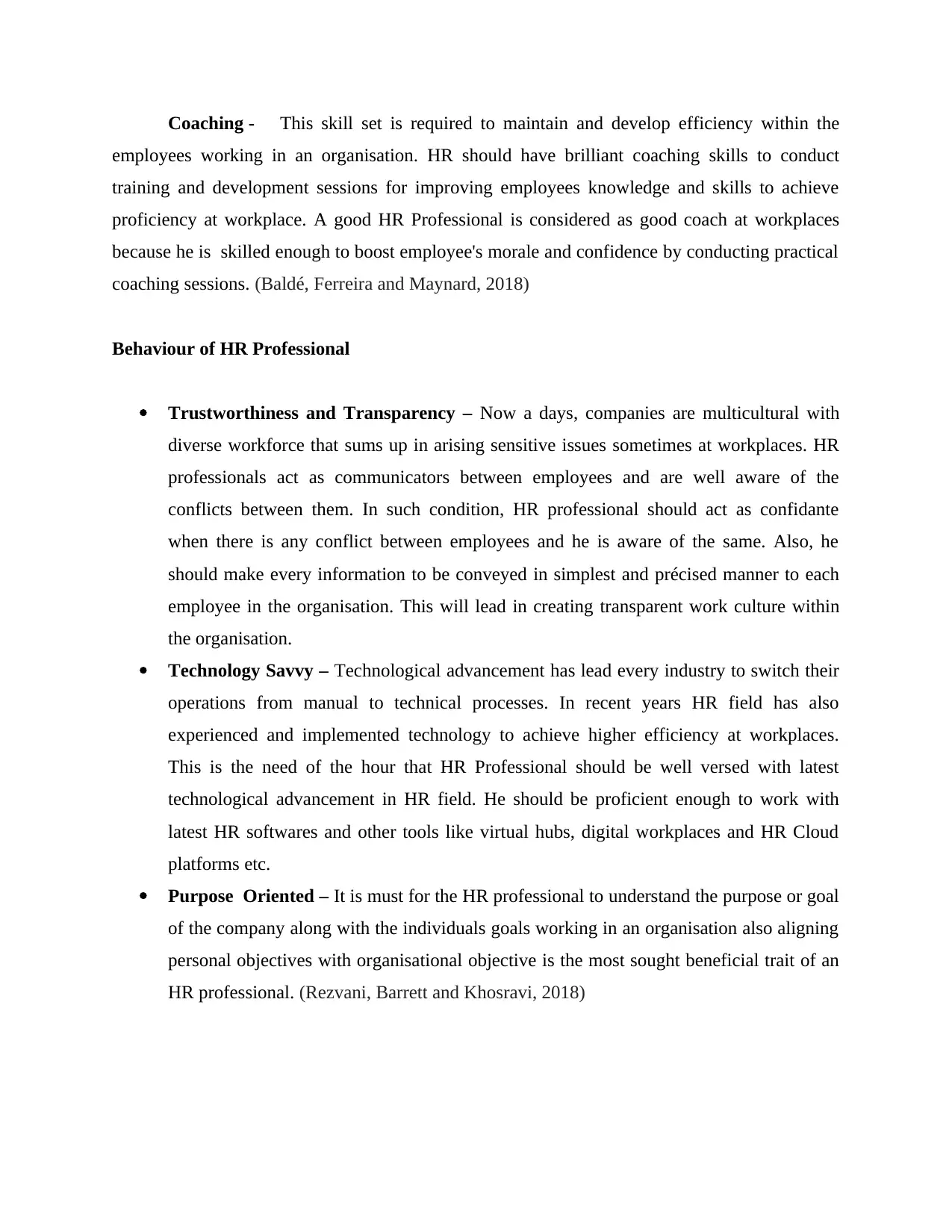
Coaching - This skill set is required to maintain and develop efficiency within the
employees working in an organisation. HR should have brilliant coaching skills to conduct
training and development sessions for improving employees knowledge and skills to achieve
proficiency at workplace. A good HR Professional is considered as good coach at workplaces
because he is skilled enough to boost employee's morale and confidence by conducting practical
coaching sessions. (Baldé, Ferreira and Maynard, 2018)
Behaviour of HR Professional
Trustworthiness and Transparency – Now a days, companies are multicultural with
diverse workforce that sums up in arising sensitive issues sometimes at workplaces. HR
professionals act as communicators between employees and are well aware of the
conflicts between them. In such condition, HR professional should act as confidante
when there is any conflict between employees and he is aware of the same. Also, he
should make every information to be conveyed in simplest and précised manner to each
employee in the organisation. This will lead in creating transparent work culture within
the organisation.
Technology Savvy – Technological advancement has lead every industry to switch their
operations from manual to technical processes. In recent years HR field has also
experienced and implemented technology to achieve higher efficiency at workplaces.
This is the need of the hour that HR Professional should be well versed with latest
technological advancement in HR field. He should be proficient enough to work with
latest HR softwares and other tools like virtual hubs, digital workplaces and HR Cloud
platforms etc.
Purpose Oriented – It is must for the HR professional to understand the purpose or goal
of the company along with the individuals goals working in an organisation also aligning
personal objectives with organisational objective is the most sought beneficial trait of an
HR professional. (Rezvani, Barrett and Khosravi, 2018)
employees working in an organisation. HR should have brilliant coaching skills to conduct
training and development sessions for improving employees knowledge and skills to achieve
proficiency at workplace. A good HR Professional is considered as good coach at workplaces
because he is skilled enough to boost employee's morale and confidence by conducting practical
coaching sessions. (Baldé, Ferreira and Maynard, 2018)
Behaviour of HR Professional
Trustworthiness and Transparency – Now a days, companies are multicultural with
diverse workforce that sums up in arising sensitive issues sometimes at workplaces. HR
professionals act as communicators between employees and are well aware of the
conflicts between them. In such condition, HR professional should act as confidante
when there is any conflict between employees and he is aware of the same. Also, he
should make every information to be conveyed in simplest and précised manner to each
employee in the organisation. This will lead in creating transparent work culture within
the organisation.
Technology Savvy – Technological advancement has lead every industry to switch their
operations from manual to technical processes. In recent years HR field has also
experienced and implemented technology to achieve higher efficiency at workplaces.
This is the need of the hour that HR Professional should be well versed with latest
technological advancement in HR field. He should be proficient enough to work with
latest HR softwares and other tools like virtual hubs, digital workplaces and HR Cloud
platforms etc.
Purpose Oriented – It is must for the HR professional to understand the purpose or goal
of the company along with the individuals goals working in an organisation also aligning
personal objectives with organisational objective is the most sought beneficial trait of an
HR professional. (Rezvani, Barrett and Khosravi, 2018)
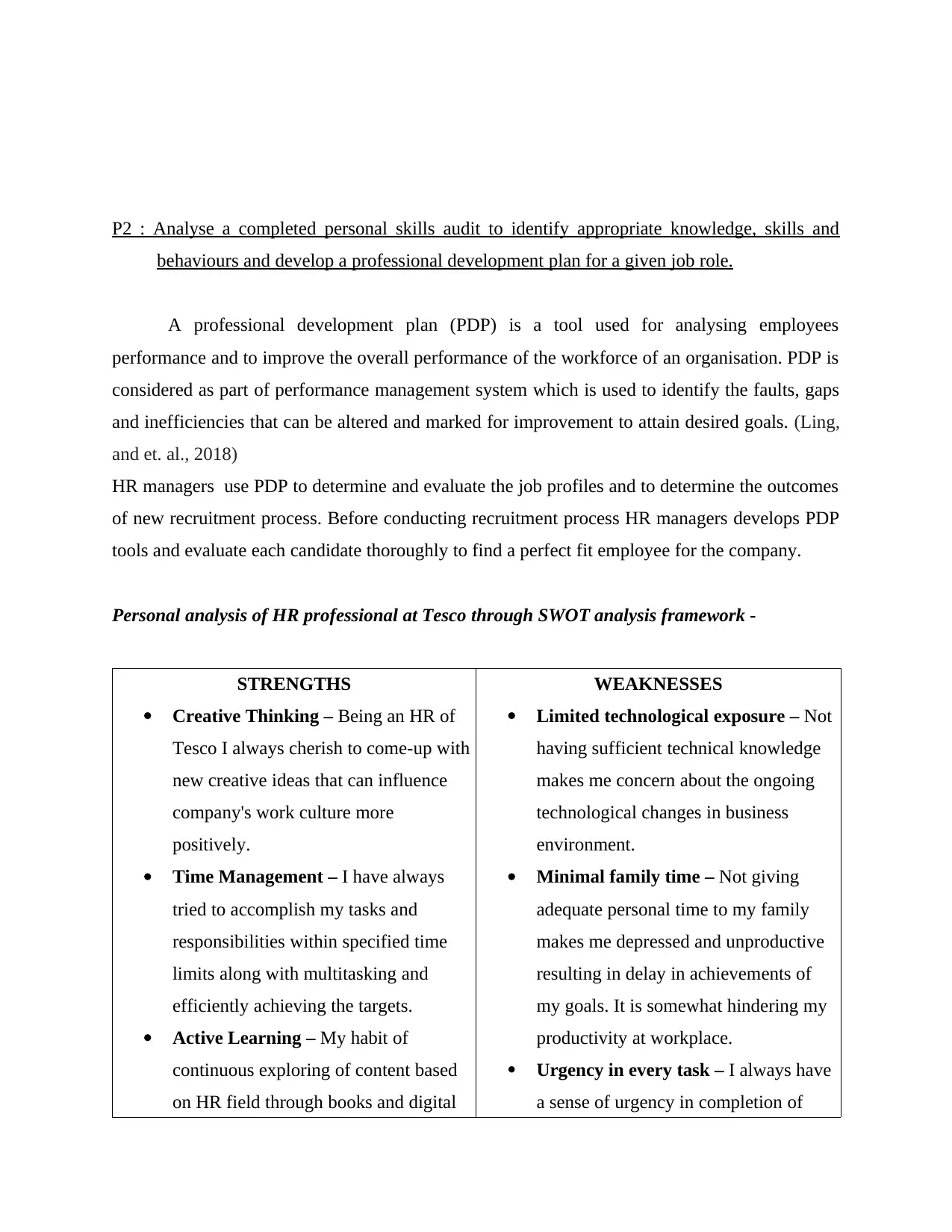
P2 : Analyse a completed personal skills audit to identify appropriate knowledge, skills and
behaviours and develop a professional development plan for a given job role.
A professional development plan (PDP) is a tool used for analysing employees
performance and to improve the overall performance of the workforce of an organisation. PDP is
considered as part of performance management system which is used to identify the faults, gaps
and inefficiencies that can be altered and marked for improvement to attain desired goals. (Ling,
and et. al., 2018)
HR managers use PDP to determine and evaluate the job profiles and to determine the outcomes
of new recruitment process. Before conducting recruitment process HR managers develops PDP
tools and evaluate each candidate thoroughly to find a perfect fit employee for the company.
Personal analysis of HR professional at Tesco through SWOT analysis framework -
STRENGTHS
Creative Thinking – Being an HR of
Tesco I always cherish to come-up with
new creative ideas that can influence
company's work culture more
positively.
Time Management – I have always
tried to accomplish my tasks and
responsibilities within specified time
limits along with multitasking and
efficiently achieving the targets.
Active Learning – My habit of
continuous exploring of content based
on HR field through books and digital
WEAKNESSES
Limited technological exposure – Not
having sufficient technical knowledge
makes me concern about the ongoing
technological changes in business
environment.
Minimal family time – Not giving
adequate personal time to my family
makes me depressed and unproductive
resulting in delay in achievements of
my goals. It is somewhat hindering my
productivity at workplace.
Urgency in every task – I always have
a sense of urgency in completion of
behaviours and develop a professional development plan for a given job role.
A professional development plan (PDP) is a tool used for analysing employees
performance and to improve the overall performance of the workforce of an organisation. PDP is
considered as part of performance management system which is used to identify the faults, gaps
and inefficiencies that can be altered and marked for improvement to attain desired goals. (Ling,
and et. al., 2018)
HR managers use PDP to determine and evaluate the job profiles and to determine the outcomes
of new recruitment process. Before conducting recruitment process HR managers develops PDP
tools and evaluate each candidate thoroughly to find a perfect fit employee for the company.
Personal analysis of HR professional at Tesco through SWOT analysis framework -
STRENGTHS
Creative Thinking – Being an HR of
Tesco I always cherish to come-up with
new creative ideas that can influence
company's work culture more
positively.
Time Management – I have always
tried to accomplish my tasks and
responsibilities within specified time
limits along with multitasking and
efficiently achieving the targets.
Active Learning – My habit of
continuous exploring of content based
on HR field through books and digital
WEAKNESSES
Limited technological exposure – Not
having sufficient technical knowledge
makes me concern about the ongoing
technological changes in business
environment.
Minimal family time – Not giving
adequate personal time to my family
makes me depressed and unproductive
resulting in delay in achievements of
my goals. It is somewhat hindering my
productivity at workplace.
Urgency in every task – I always have
a sense of urgency in completion of
⊘ This is a preview!⊘
Do you want full access?
Subscribe today to unlock all pages.

Trusted by 1+ million students worldwide
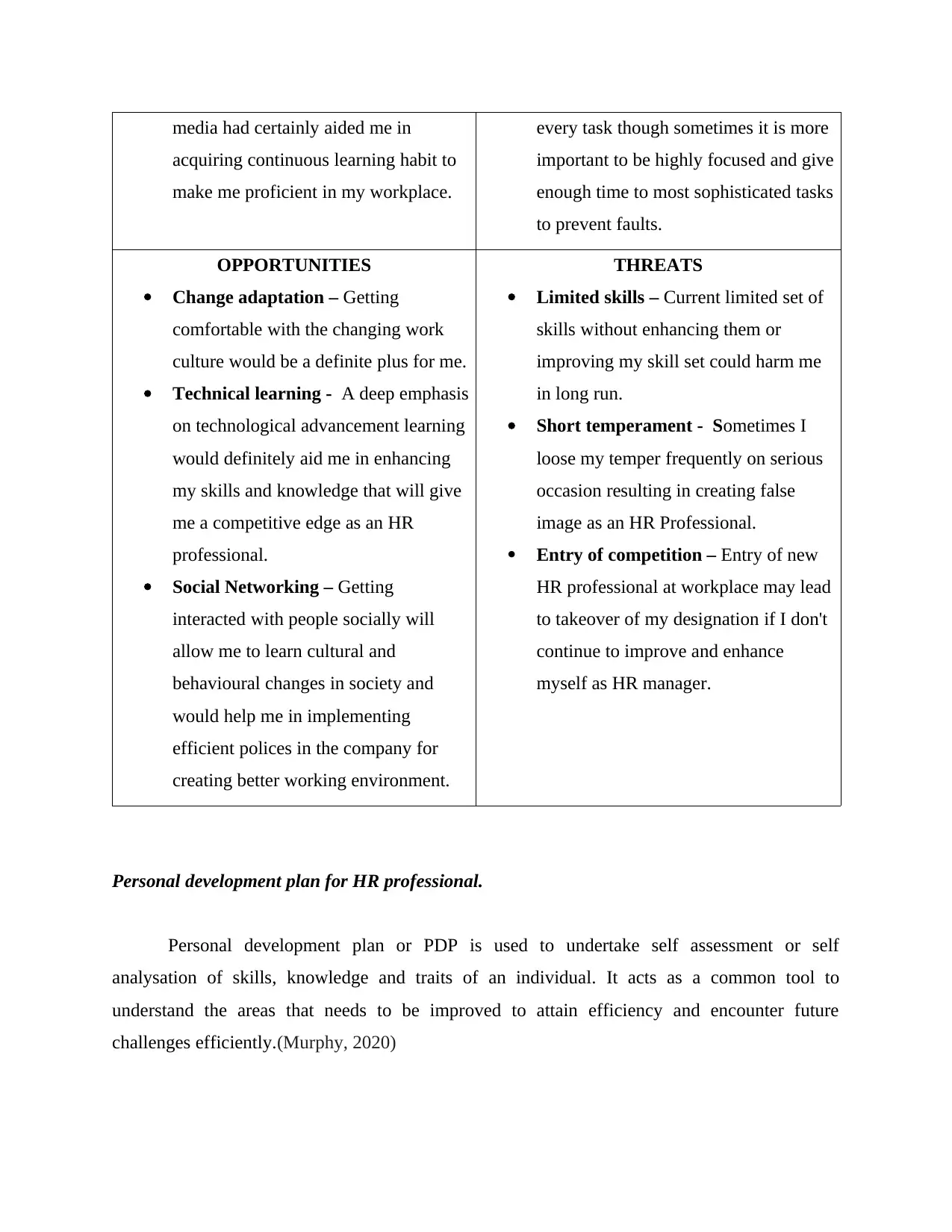
media had certainly aided me in
acquiring continuous learning habit to
make me proficient in my workplace.
every task though sometimes it is more
important to be highly focused and give
enough time to most sophisticated tasks
to prevent faults.
OPPORTUNITIES
Change adaptation – Getting
comfortable with the changing work
culture would be a definite plus for me.
Technical learning - A deep emphasis
on technological advancement learning
would definitely aid me in enhancing
my skills and knowledge that will give
me a competitive edge as an HR
professional.
Social Networking – Getting
interacted with people socially will
allow me to learn cultural and
behavioural changes in society and
would help me in implementing
efficient polices in the company for
creating better working environment.
THREATS
Limited skills – Current limited set of
skills without enhancing them or
improving my skill set could harm me
in long run.
Short temperament - Sometimes I
loose my temper frequently on serious
occasion resulting in creating false
image as an HR Professional.
Entry of competition – Entry of new
HR professional at workplace may lead
to takeover of my designation if I don't
continue to improve and enhance
myself as HR manager.
Personal development plan for HR professional.
Personal development plan or PDP is used to undertake self assessment or self
analysation of skills, knowledge and traits of an individual. It acts as a common tool to
understand the areas that needs to be improved to attain efficiency and encounter future
challenges efficiently.(Murphy, 2020)
acquiring continuous learning habit to
make me proficient in my workplace.
every task though sometimes it is more
important to be highly focused and give
enough time to most sophisticated tasks
to prevent faults.
OPPORTUNITIES
Change adaptation – Getting
comfortable with the changing work
culture would be a definite plus for me.
Technical learning - A deep emphasis
on technological advancement learning
would definitely aid me in enhancing
my skills and knowledge that will give
me a competitive edge as an HR
professional.
Social Networking – Getting
interacted with people socially will
allow me to learn cultural and
behavioural changes in society and
would help me in implementing
efficient polices in the company for
creating better working environment.
THREATS
Limited skills – Current limited set of
skills without enhancing them or
improving my skill set could harm me
in long run.
Short temperament - Sometimes I
loose my temper frequently on serious
occasion resulting in creating false
image as an HR Professional.
Entry of competition – Entry of new
HR professional at workplace may lead
to takeover of my designation if I don't
continue to improve and enhance
myself as HR manager.
Personal development plan for HR professional.
Personal development plan or PDP is used to undertake self assessment or self
analysation of skills, knowledge and traits of an individual. It acts as a common tool to
understand the areas that needs to be improved to attain efficiency and encounter future
challenges efficiently.(Murphy, 2020)
Paraphrase This Document
Need a fresh take? Get an instant paraphrase of this document with our AI Paraphraser
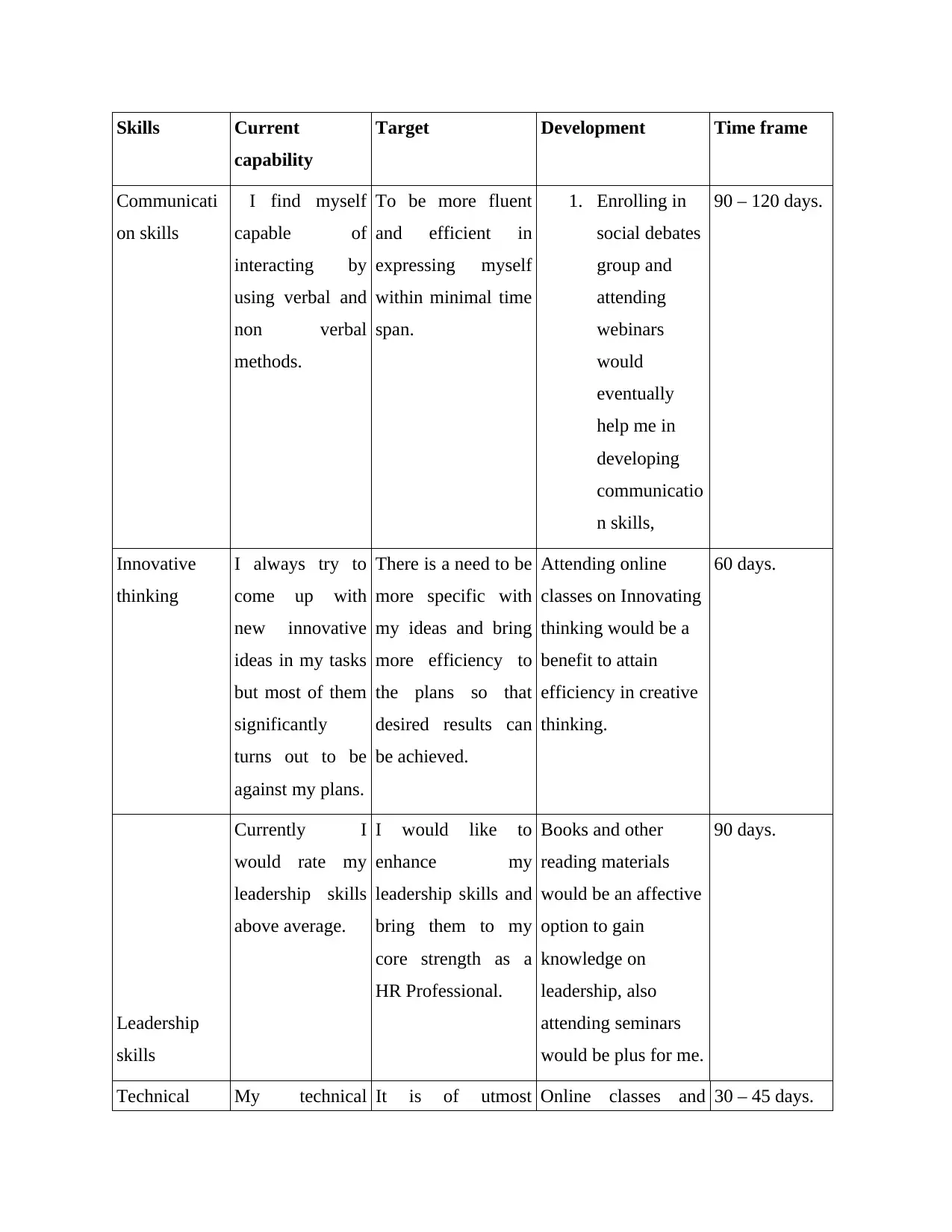
Skills Current
capability
Target Development Time frame
Communicati
on skills
I find myself
capable of
interacting by
using verbal and
non verbal
methods.
To be more fluent
and efficient in
expressing myself
within minimal time
span.
1. Enrolling in
social debates
group and
attending
webinars
would
eventually
help me in
developing
communicatio
n skills,
90 – 120 days.
Innovative
thinking
I always try to
come up with
new innovative
ideas in my tasks
but most of them
significantly
turns out to be
against my plans.
There is a need to be
more specific with
my ideas and bring
more efficiency to
the plans so that
desired results can
be achieved.
Attending online
classes on Innovating
thinking would be a
benefit to attain
efficiency in creative
thinking.
60 days.
Leadership
skills
Currently I
would rate my
leadership skills
above average.
I would like to
enhance my
leadership skills and
bring them to my
core strength as a
HR Professional.
Books and other
reading materials
would be an affective
option to gain
knowledge on
leadership, also
attending seminars
would be plus for me.
90 days.
Technical My technical It is of utmost Online classes and 30 – 45 days.
capability
Target Development Time frame
Communicati
on skills
I find myself
capable of
interacting by
using verbal and
non verbal
methods.
To be more fluent
and efficient in
expressing myself
within minimal time
span.
1. Enrolling in
social debates
group and
attending
webinars
would
eventually
help me in
developing
communicatio
n skills,
90 – 120 days.
Innovative
thinking
I always try to
come up with
new innovative
ideas in my tasks
but most of them
significantly
turns out to be
against my plans.
There is a need to be
more specific with
my ideas and bring
more efficiency to
the plans so that
desired results can
be achieved.
Attending online
classes on Innovating
thinking would be a
benefit to attain
efficiency in creative
thinking.
60 days.
Leadership
skills
Currently I
would rate my
leadership skills
above average.
I would like to
enhance my
leadership skills and
bring them to my
core strength as a
HR Professional.
Books and other
reading materials
would be an affective
option to gain
knowledge on
leadership, also
attending seminars
would be plus for me.
90 days.
Technical My technical It is of utmost Online classes and 30 – 45 days.
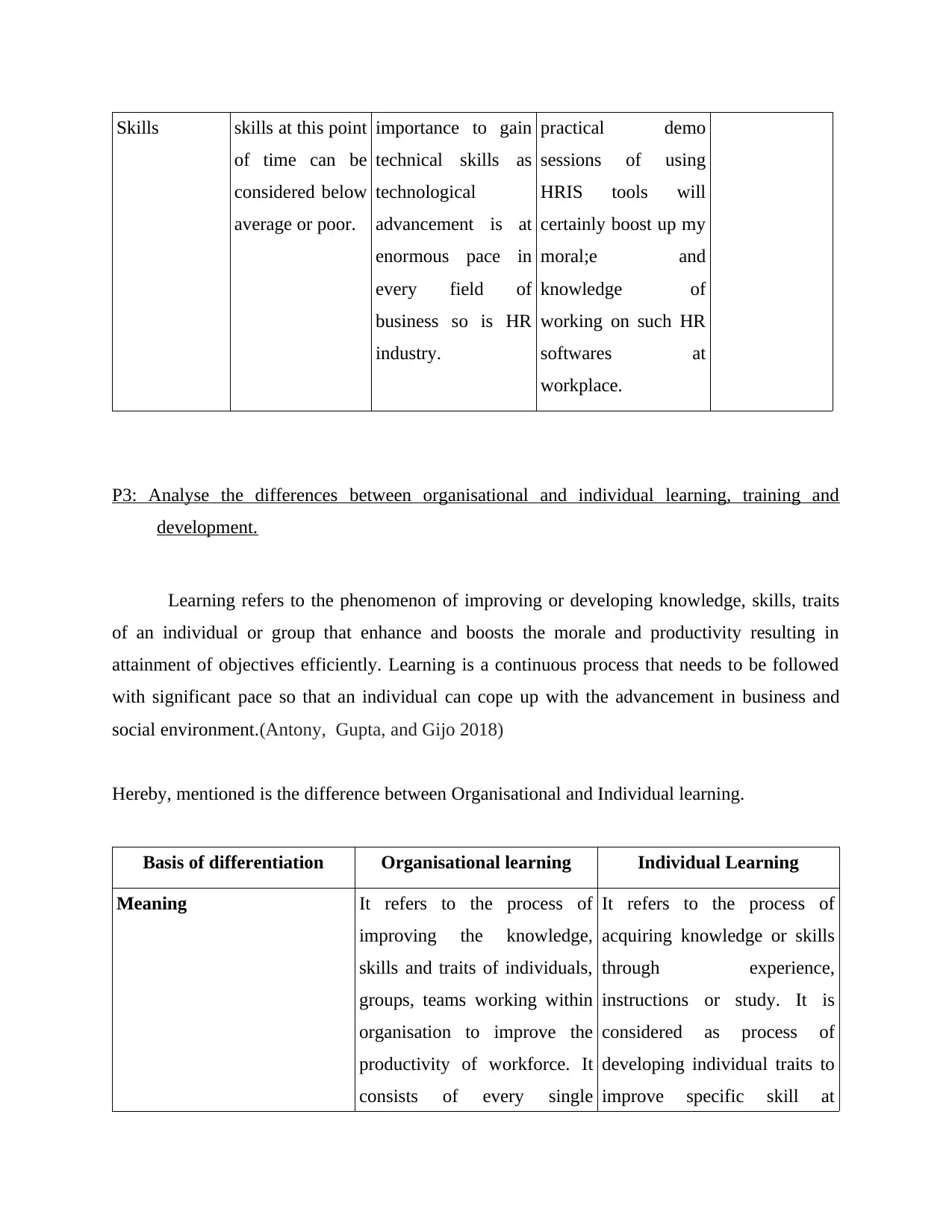
Skills skills at this point
of time can be
considered below
average or poor.
importance to gain
technical skills as
technological
advancement is at
enormous pace in
every field of
business so is HR
industry.
practical demo
sessions of using
HRIS tools will
certainly boost up my
moral;e and
knowledge of
working on such HR
softwares at
workplace.
P3: Analyse the differences between organisational and individual learning, training and
development.
Learning refers to the phenomenon of improving or developing knowledge, skills, traits
of an individual or group that enhance and boosts the morale and productivity resulting in
attainment of objectives efficiently. Learning is a continuous process that needs to be followed
with significant pace so that an individual can cope up with the advancement in business and
social environment.(Antony, Gupta, and Gijo 2018)
Hereby, mentioned is the difference between Organisational and Individual learning.
Basis of differentiation Organisational learning Individual Learning
Meaning It refers to the process of
improving the knowledge,
skills and traits of individuals,
groups, teams working within
organisation to improve the
productivity of workforce. It
consists of every single
It refers to the process of
acquiring knowledge or skills
through experience,
instructions or study. It is
considered as process of
developing individual traits to
improve specific skill at
of time can be
considered below
average or poor.
importance to gain
technical skills as
technological
advancement is at
enormous pace in
every field of
business so is HR
industry.
practical demo
sessions of using
HRIS tools will
certainly boost up my
moral;e and
knowledge of
working on such HR
softwares at
workplace.
P3: Analyse the differences between organisational and individual learning, training and
development.
Learning refers to the phenomenon of improving or developing knowledge, skills, traits
of an individual or group that enhance and boosts the morale and productivity resulting in
attainment of objectives efficiently. Learning is a continuous process that needs to be followed
with significant pace so that an individual can cope up with the advancement in business and
social environment.(Antony, Gupta, and Gijo 2018)
Hereby, mentioned is the difference between Organisational and Individual learning.
Basis of differentiation Organisational learning Individual Learning
Meaning It refers to the process of
improving the knowledge,
skills and traits of individuals,
groups, teams working within
organisation to improve the
productivity of workforce. It
consists of every single
It refers to the process of
acquiring knowledge or skills
through experience,
instructions or study. It is
considered as process of
developing individual traits to
improve specific skill at
⊘ This is a preview!⊘
Do you want full access?
Subscribe today to unlock all pages.

Trusted by 1+ million students worldwide
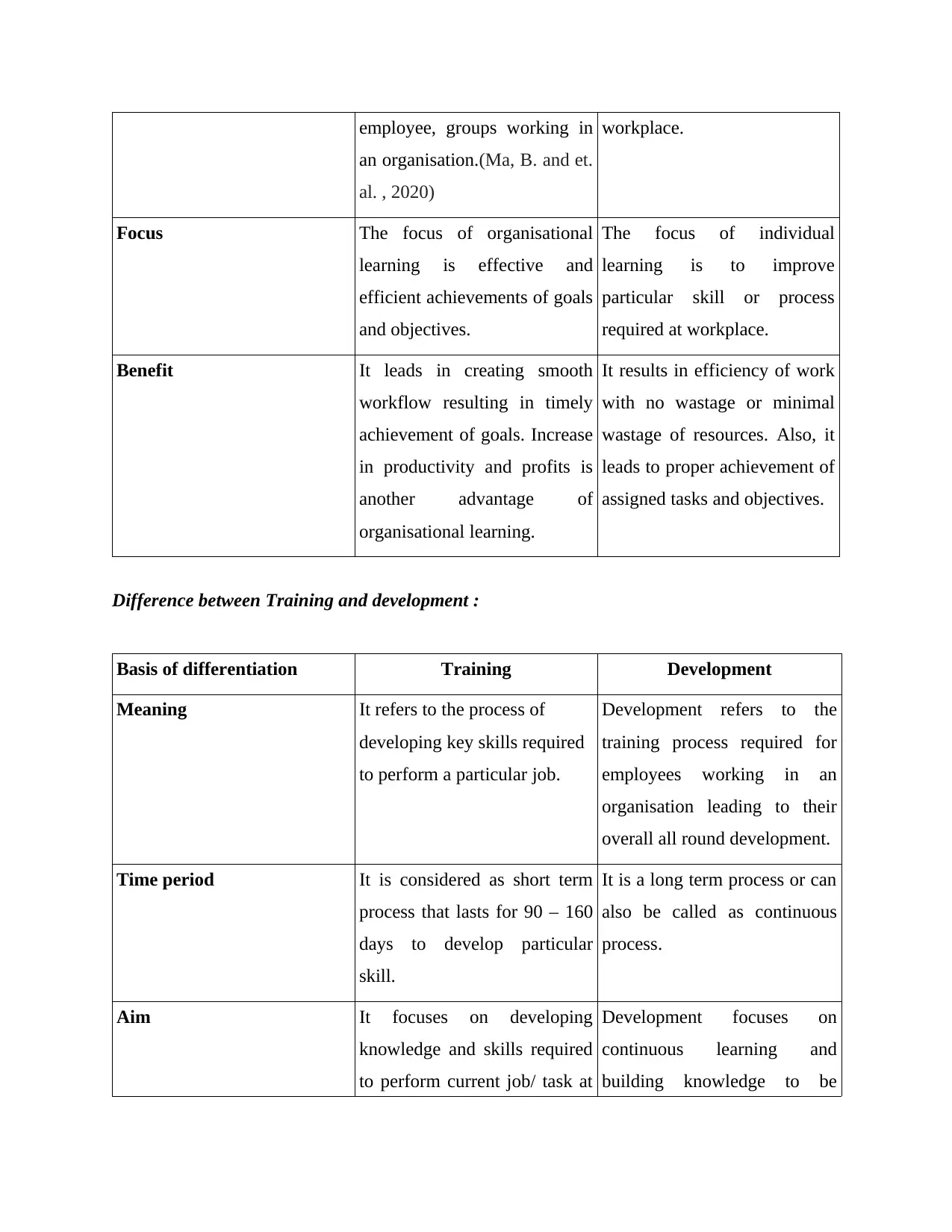
employee, groups working in
an organisation.(Ma, B. and et.
al. , 2020)
workplace.
Focus The focus of organisational
learning is effective and
efficient achievements of goals
and objectives.
The focus of individual
learning is to improve
particular skill or process
required at workplace.
Benefit It leads in creating smooth
workflow resulting in timely
achievement of goals. Increase
in productivity and profits is
another advantage of
organisational learning.
It results in efficiency of work
with no wastage or minimal
wastage of resources. Also, it
leads to proper achievement of
assigned tasks and objectives.
Difference between Training and development :
Basis of differentiation Training Development
Meaning It refers to the process of
developing key skills required
to perform a particular job.
Development refers to the
training process required for
employees working in an
organisation leading to their
overall all round development.
Time period It is considered as short term
process that lasts for 90 – 160
days to develop particular
skill.
It is a long term process or can
also be called as continuous
process.
Aim It focuses on developing
knowledge and skills required
to perform current job/ task at
Development focuses on
continuous learning and
building knowledge to be
an organisation.(Ma, B. and et.
al. , 2020)
workplace.
Focus The focus of organisational
learning is effective and
efficient achievements of goals
and objectives.
The focus of individual
learning is to improve
particular skill or process
required at workplace.
Benefit It leads in creating smooth
workflow resulting in timely
achievement of goals. Increase
in productivity and profits is
another advantage of
organisational learning.
It results in efficiency of work
with no wastage or minimal
wastage of resources. Also, it
leads to proper achievement of
assigned tasks and objectives.
Difference between Training and development :
Basis of differentiation Training Development
Meaning It refers to the process of
developing key skills required
to perform a particular job.
Development refers to the
training process required for
employees working in an
organisation leading to their
overall all round development.
Time period It is considered as short term
process that lasts for 90 – 160
days to develop particular
skill.
It is a long term process or can
also be called as continuous
process.
Aim It focuses on developing
knowledge and skills required
to perform current job/ task at
Development focuses on
continuous learning and
building knowledge to be
Paraphrase This Document
Need a fresh take? Get an instant paraphrase of this document with our AI Paraphraser
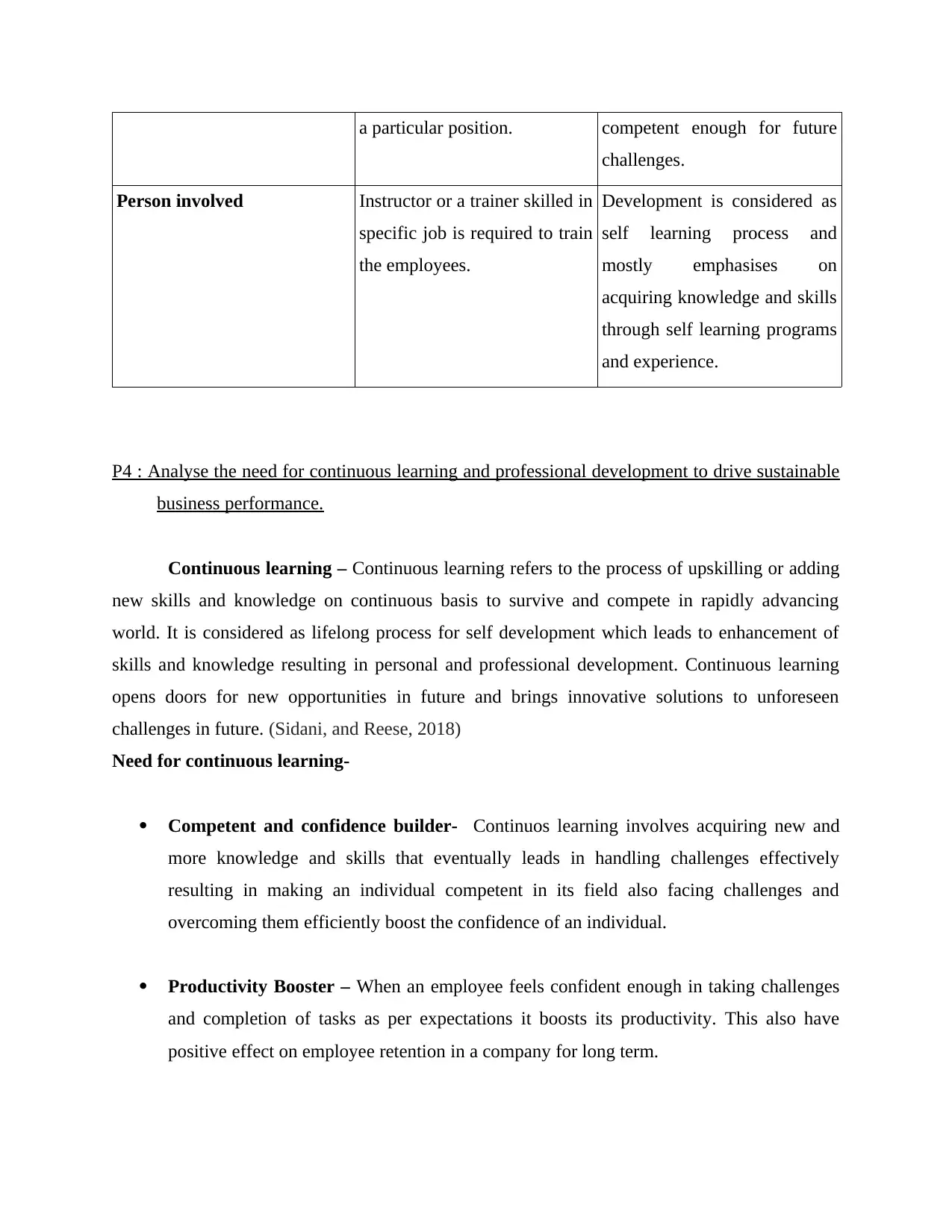
a particular position. competent enough for future
challenges.
Person involved Instructor or a trainer skilled in
specific job is required to train
the employees.
Development is considered as
self learning process and
mostly emphasises on
acquiring knowledge and skills
through self learning programs
and experience.
P4 : Analyse the need for continuous learning and professional development to drive sustainable
business performance.
Continuous learning – Continuous learning refers to the process of upskilling or adding
new skills and knowledge on continuous basis to survive and compete in rapidly advancing
world. It is considered as lifelong process for self development which leads to enhancement of
skills and knowledge resulting in personal and professional development. Continuous learning
opens doors for new opportunities in future and brings innovative solutions to unforeseen
challenges in future. (Sidani, and Reese, 2018)
Need for continuous learning-
Competent and confidence builder- Continuos learning involves acquiring new and
more knowledge and skills that eventually leads in handling challenges effectively
resulting in making an individual competent in its field also facing challenges and
overcoming them efficiently boost the confidence of an individual.
Productivity Booster – When an employee feels confident enough in taking challenges
and completion of tasks as per expectations it boosts its productivity. This also have
positive effect on employee retention in a company for long term.
challenges.
Person involved Instructor or a trainer skilled in
specific job is required to train
the employees.
Development is considered as
self learning process and
mostly emphasises on
acquiring knowledge and skills
through self learning programs
and experience.
P4 : Analyse the need for continuous learning and professional development to drive sustainable
business performance.
Continuous learning – Continuous learning refers to the process of upskilling or adding
new skills and knowledge on continuous basis to survive and compete in rapidly advancing
world. It is considered as lifelong process for self development which leads to enhancement of
skills and knowledge resulting in personal and professional development. Continuous learning
opens doors for new opportunities in future and brings innovative solutions to unforeseen
challenges in future. (Sidani, and Reese, 2018)
Need for continuous learning-
Competent and confidence builder- Continuos learning involves acquiring new and
more knowledge and skills that eventually leads in handling challenges effectively
resulting in making an individual competent in its field also facing challenges and
overcoming them efficiently boost the confidence of an individual.
Productivity Booster – When an employee feels confident enough in taking challenges
and completion of tasks as per expectations it boosts its productivity. This also have
positive effect on employee retention in a company for long term.
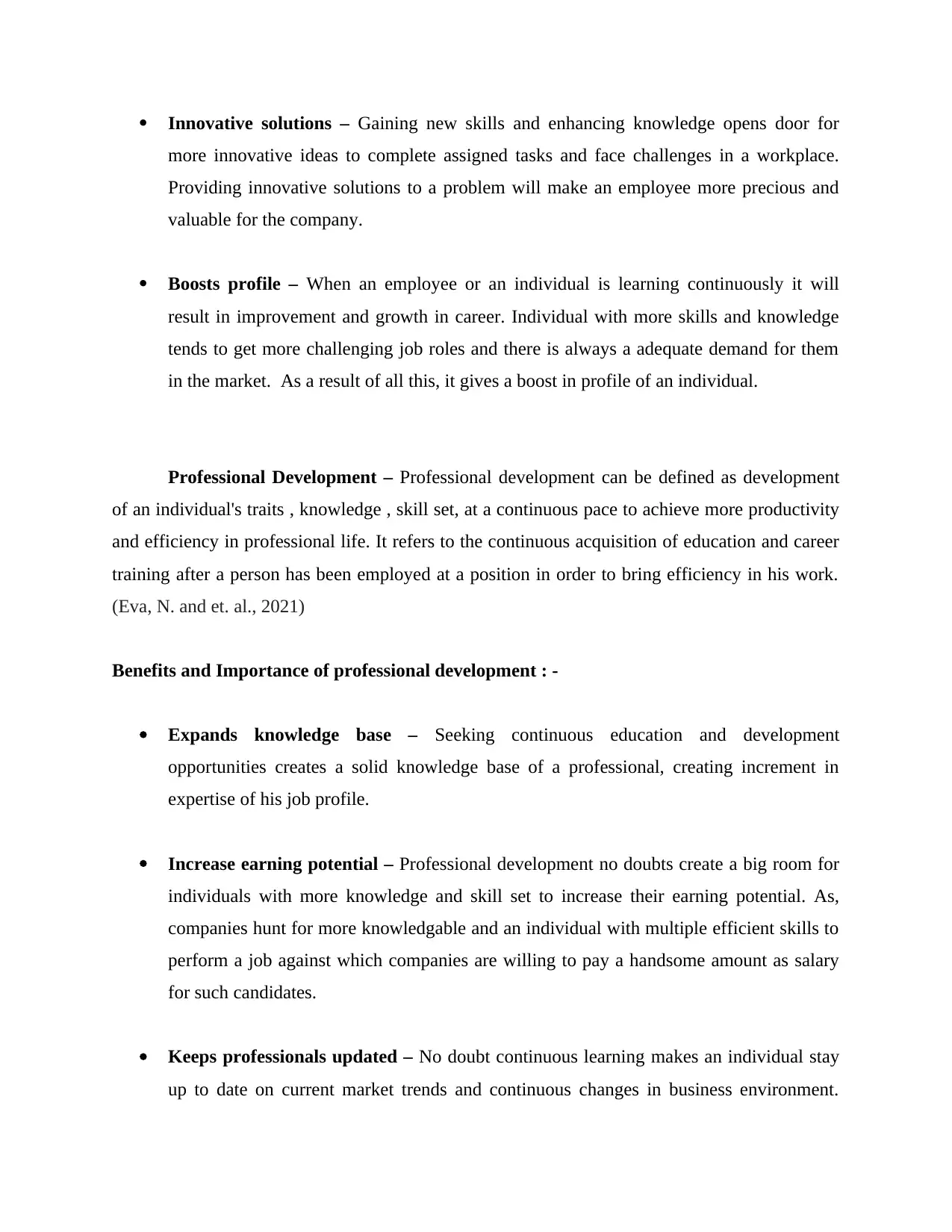
Innovative solutions – Gaining new skills and enhancing knowledge opens door for
more innovative ideas to complete assigned tasks and face challenges in a workplace.
Providing innovative solutions to a problem will make an employee more precious and
valuable for the company.
Boosts profile – When an employee or an individual is learning continuously it will
result in improvement and growth in career. Individual with more skills and knowledge
tends to get more challenging job roles and there is always a adequate demand for them
in the market. As a result of all this, it gives a boost in profile of an individual.
Professional Development – Professional development can be defined as development
of an individual's traits , knowledge , skill set, at a continuous pace to achieve more productivity
and efficiency in professional life. It refers to the continuous acquisition of education and career
training after a person has been employed at a position in order to bring efficiency in his work.
(Eva, N. and et. al., 2021)
Benefits and Importance of professional development : -
Expands knowledge base – Seeking continuous education and development
opportunities creates a solid knowledge base of a professional, creating increment in
expertise of his job profile.
Increase earning potential – Professional development no doubts create a big room for
individuals with more knowledge and skill set to increase their earning potential. As,
companies hunt for more knowledgable and an individual with multiple efficient skills to
perform a job against which companies are willing to pay a handsome amount as salary
for such candidates.
Keeps professionals updated – No doubt continuous learning makes an individual stay
up to date on current market trends and continuous changes in business environment.
more innovative ideas to complete assigned tasks and face challenges in a workplace.
Providing innovative solutions to a problem will make an employee more precious and
valuable for the company.
Boosts profile – When an employee or an individual is learning continuously it will
result in improvement and growth in career. Individual with more skills and knowledge
tends to get more challenging job roles and there is always a adequate demand for them
in the market. As a result of all this, it gives a boost in profile of an individual.
Professional Development – Professional development can be defined as development
of an individual's traits , knowledge , skill set, at a continuous pace to achieve more productivity
and efficiency in professional life. It refers to the continuous acquisition of education and career
training after a person has been employed at a position in order to bring efficiency in his work.
(Eva, N. and et. al., 2021)
Benefits and Importance of professional development : -
Expands knowledge base – Seeking continuous education and development
opportunities creates a solid knowledge base of a professional, creating increment in
expertise of his job profile.
Increase earning potential – Professional development no doubts create a big room for
individuals with more knowledge and skill set to increase their earning potential. As,
companies hunt for more knowledgable and an individual with multiple efficient skills to
perform a job against which companies are willing to pay a handsome amount as salary
for such candidates.
Keeps professionals updated – No doubt continuous learning makes an individual stay
up to date on current market trends and continuous changes in business environment.
⊘ This is a preview!⊘
Do you want full access?
Subscribe today to unlock all pages.

Trusted by 1+ million students worldwide
1 out of 18
Related Documents
Your All-in-One AI-Powered Toolkit for Academic Success.
+13062052269
info@desklib.com
Available 24*7 on WhatsApp / Email
![[object Object]](/_next/static/media/star-bottom.7253800d.svg)
Unlock your academic potential
Copyright © 2020–2026 A2Z Services. All Rights Reserved. Developed and managed by ZUCOL.



